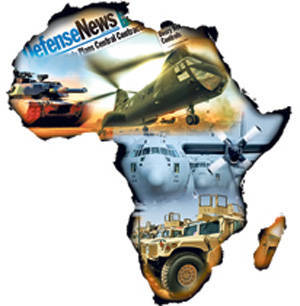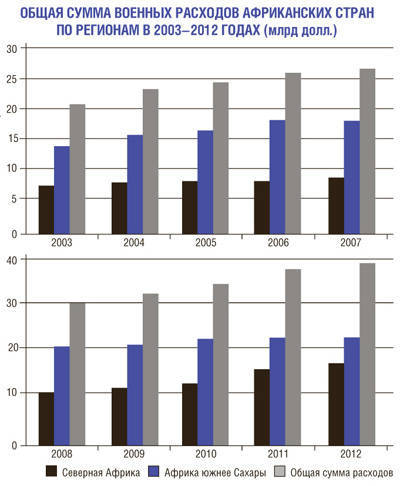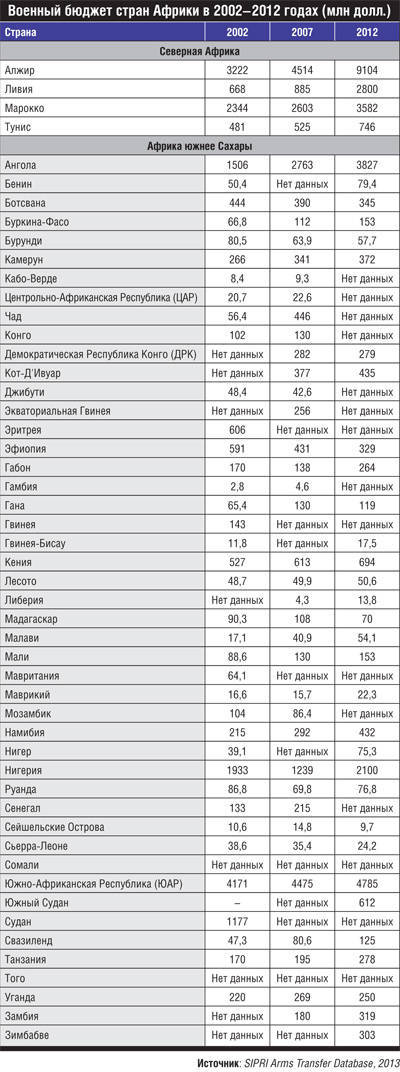Africa chooses militarization
The poorest continent in the world, Africa, has become the target of fierce competition from Western defense companies. Defense News predicts that by 2022, the cost of acquiring weapons here will exceed $ 20 billion, which is comparable to the size of the arms market in richer Southeast Asia. Analysts at the British company Frost & Sullivan estimate defense spending in the Middle East and Africa by 2021 at $ 45,49 billion.
As follows from the report of the Stockholm Peace Research Institute (SIPRI), imports of African countries in 2003 – 2012 increased by 104 percent. While in 2003 – 2007, their share was only five percent in the total world arms turnover, in 2008 – 2012 this figure exceeded nine percent, that is, it almost doubled.
Algeria, Morocco and South Africa were the largest consumers of drug products in Africa in 2008 – 2012. Algeria alone increased imports from 2003 to 277 percent and immediately rose in the list of the world's largest arms buyers from 22 to 6. Military supplies to Morocco during the same time increased even more - by as much as 1460 percent. In the world rankings, the country soared from 69-th to 12-th place. Against the background of two states, the Maghreb South Africa looks modest, having reduced its 2008 percent activity in 2012 – 40 years compared to the previous five-year period. This is explained by the fact that the country as a whole has completed the modernization of its armed forces. But at the same time, approximately 24 of the percentage of defense drug imports to the countries south of the Sahara in 2008 – 2012 was due to South Africa. Uganda and Sudan come next, purchasing 15 and 12 percent respectively.
 Analysts explain the predicted continuation of growth of the African arms market in the next ten years by three main factors.
Analysts explain the predicted continuation of growth of the African arms market in the next ten years by three main factors.The first is the spread of terrorism and Islam from the Middle East, the intensification of local rebel groups (Mali, Central African Republic, Kenya), sea piracy. To combat them, governments are forced to shell out more and more on military equipment.
The second is the need to protect hydrocarbon resources recently discovered on land and on the African shelf. This is especially true for the three states. This is Mozambique, which along with neighboring Tanzania is the center of industrial activity in gas production, Uganda and Kenya, where oil and gas resources have been found not so long ago.
The third - the military budgets of the United States and NATO countries are significantly reduced, and Western manufacturers are actively looking for new markets.
The Defense News quotes the researchers' forecasts: “The demand for military equipment in Africa will grow as governments strengthen anti-terrorism measures and counter Islamic radical groups.”
For its part, Oxford Analytics magazine notes that reinforcement of the armies is observed in most states of sub-Saharan Africa, despite their poverty. First of all, militarization is due to the growing number of Western-funded peacekeeping operations involving regional armed forces. This is most characteristic of Uganda, Ethiopia, Kenya and Nigeria. “It is obvious that since 2001, African armies have been supported at a level that they have not had since the days of the Cold War,” says Oxford Analyst. At the same time, the publication notes the ambiguous consequences of such support.
A similar idea is expressed by Colonel Joseph Seaband, a retired Zimbabwe army officer, and now an expert in defense matters. Serious reinforcement by the African armies began with 2001, and the process is primarily associated with regional counter-terrorism activities, especially in the oil-and-gas-rich Mediterranean belt and in the Horn of Africa, where Al-Qaida and its cells were very active. According to Seaband, increasing defensive capabilities and counter-terrorism capabilities will require the purchase of patrol ships, sea patrol aircraft, and possibly unmanned aerial vehicles (UAV).
The agreements and defense contracts signed last year confirm the forecasts of experts. For example, Mozambique recently announced the conclusion of a 200-million (in dollars) deal with the French shipyard CMN. According to the contract, the French must build not only 24 fishing trawlers, but also three patrol and three high-speed interceptor vessels.
North of the Sahara
In June 2012, the Defense Security Cooperation Agency (DSCA) notified Congress of a possible supply of Morocco 200 tanks M1A1 SA "Abrams", as well as auxiliary equipment, logistics, training and related components. All this in the framework of the American program of export of military equipment FMS (US Foreign Military Sales Program). The total transaction amount is $ 1,015 billion. According to experts, its implementation will make it possible to modernize the tank fleet of Morocco, increase its capabilities to meet modern and future threats, and improve interaction with the US armies and their allies. In addition, the country recently asked Boeing to purchase three CH-47D Chinook military transport helicopters to expand its fleet to six units.

World leaders - Boeing, Airbus Military (Airbus Military) and holding Russian Helicopters expect an increase in demand in the next decade for new and modernized military aircraft and avionics in Africa. It is assumed that African countries have begun to spend large sums on improving the possibilities of observing maritime and land borders from the air and fighting terrorism. This is in addition to solving the immediate problems of continental security. “Africa is a new market for us. We are trying to activate it and begin to understand this market, but it takes time. Although Africa is not a cherished goal today, it will be an interesting region in the long run, ”said Paul Oliver, Vice President of the Boeing Defense in the Middle East and Africa.
Among the largest African clients of the company is Libya, which intends to acquire the Chinook transport helicopter - 22 machines CH-16D and six CH-47F as part of the US-implemented Foreign Assistance Program for the Foreign States FMA (Foreign Military Assistance Program). By the way, 47 of American Humvee (HUMVEE) is also available in Libya. The 287 machines have already been handed over to the customer, 24 is on the way, and the whole transaction is completed by the end of 30.
 At the same time, the expediency of sales of Lockheed Martin C-130J-30 military transport aircraft to this country is being discussed. In June of the current year, the DSCA agency notified the congress about the possible delivery to Libya of two C-130J-30, related equipment, spare parts and logistical support equipment in the amount of 588 million dollars within the FMS program. The package will also include Rolls-Royce 10 AE 2100D3 engines (eight in planes and two standby).
At the same time, the expediency of sales of Lockheed Martin C-130J-30 military transport aircraft to this country is being discussed. In June of the current year, the DSCA agency notified the congress about the possible delivery to Libya of two C-130J-30, related equipment, spare parts and logistical support equipment in the amount of 588 million dollars within the FMS program. The package will also include Rolls-Royce 10 AE 2100D3 engines (eight in planes and two standby).In April, 2013, the first military transporters of the C-130J Super Hercules appeared in the skies of Africa. Tunisia became their customer. The contract was signed in 2010, it provided for the delivery of two C-130J in 2013 – 2014, training of personnel and logistic support in the first three years of operation. Now the Air Forces of this country exploit one C-130H and one C-130B, which they bought in the middle of the 80-s. In Tunisia, the problems of terrorism and threats to the sea are acute, and there is a struggle there against mixed groups of terrorists like Al Qaeda in the Islamic Maghreb. Therefore, the authorities intend to modernize the existing 12 Tiger-5 (Tiger II) F-2 fighter jets, equipping them with a new Northrop Grumman avionics production as part of a 60 million dollar-sponsored deal.
Boeing also hopes to meet Algeria’s growing demand for transport aircraft, surveillance systems, reconnaissance and data collection, helicopters and air refueling systems. Since the beginning of the year, the Air Forces of this country have carried out evaluation tests of the C-17 “Globemaster III” strategic transporter manufactured by Boeing and the multipurpose A3 MRTT produced by Airbus Military. New airplanes are supposed to replace the aging IL-330 fleet. The Air Force is also showing an interest in the promising Boeing KC-78 air tanker, which is due to appear in the 46 year.
In August, Algeria received a portion of the six ordered King Air 350ER reconnaissance aircraft, equipped with radar and night vision thermal imaging equipment to monitor land and sea targets. They are deployed in the 350 Squadron of the Algerian Air Force's air reconnaissance, control national and international security threats such as the smuggling of drugs, weapons, as well as a growing number of Al-Qaeda-type rebel Militia groups.
In Egypt, they preferred to order six BTS C-295 produced by Airbus Military. Their delivery should be completed by the end of the year, and the air force fleet will increase to the 12 of these aircraft. Neighboring Chad purchased from the Italian Alenia Aermacchi (Alenia Aermacchi) two new C-27J Spartan. These transport aircraft are now on the final assembly line in Italy and must be handed over to the customer by the end of the year. They are designed to combat international terrorist groups operating in remote areas. The country is still armed with two Russian An-26 and one C-130H "Hercules", which have been in operation since 1994 and 1989, respectively.
Sub Sahara
Niger cannot boast of a significant military budget, so it is mainly modernizing its air force. The existing DA-42 Twin Star observation aircraft of the Austrian company Diamond Aircraft have been re-equipped with new equipment for information collection, reconnaissance and surveillance. The modernization will be carried out under the new program of the Center aviation US Navy's Counter-Networks and Illicit Trafficking Program (CNIT) and is part of US assistance in Niger's fight against trans-Sahel terrorism and smuggling.
 Under the same program, the country also received two new Cessna Caravan aircraft, which will be used to ensure border security and as a freight vehicle.
Under the same program, the country also received two new Cessna Caravan aircraft, which will be used to ensure border security and as a freight vehicle.In February 2013, Angola received the first three Super Tucano A-29 turboprop aircraft out of six ordered from Embraer, a Brazilian company. They belong to the class of light percussion and training aircraft (TCB). The order was issued in April last year. As part of the Angolan Air Force A-29 will patrol the border, although there are no reports that they will install onboard surveillance equipment. Angola became the third on the continent after Burkina Faso and Mauritania, which received Brazilian products. In addition to them, in aviation there are turboprop TC “Tukano”, “Pilatus” PC-7 and PC-9. The weekly Janes Defense Weekly celebrates a growing supply from Latin America to Africa: it will reach 2013 million dollars in 2015 – 311 years. Brazil’s main partners are Angola, Burkina Faso and Mauritania, the main export item is TC-A-29.
Luanda also acquired, through Rosoboronexport, 18 used Su-30K fighter aircraft in India and spare parts for Mi-17 helicopters. This agreement is part of a $ 1 billion deal signed during the October trip to Angola, Brazil and Peru by Russian Deputy Prime Minister Dmitry Rogozin. Russia is ready to restore, upgrade and deliver an additional number of Su-30 fighters to all traditional partners, including Uganda, Angola and Ethiopia, Rosoboronexport said. Angola is also relatively solvent - it is the second largest producer of oil on the continent after Nigeria. Its defense budget is over six billion dollars, one of the largest in Africa. According to the Minister of National Defense Candida Pereira dos Santos, the government intends to create its own defense industry, which is on the national development plan for 2013 – 2017 years among the priorities.
In general, when assessing the growing market for military equipment on the continent, experts always remember about possible competition for Western manufacturers from national military-industrial complexes. So far, only South Africa and Egypt have their own production facilities. The South African defense industry, led by Denel, produces world-competitive, advanced missile, artillery and aerospace systems. Danel and Switzerland's B&T recently signed a technology transfer agreement that will produce and market small arms from South Africans, from submachine guns to grenade launchers. First, Danel will use Swiss components, and with the complete modernization of its plant, it will start producing them in South Africa.
His division Danel Aviation, meanwhile, has concluded an agreement with Eurocopter for the repair and maintenance in Africa of the AS332 Super Puma (Super Puma), BO 105, AS350 Ecurey (Ecureuil) helicopters, and the old Aluet ( Alouette).
The South African division of the Rhinemetal concern, the Denel Munition company, from September 2014 will be producing 120 millimeter-mortar shots for a certain customer in the Middle East / North Africa region. In September, Rheinmetall announced a contract worth about 50 million euros for the production of tens of thousands of shots for modern customer 120-millimeter self-propelled mortars. The range of shots is 8000 meters, and their ballistic characteristics are purposefully adapted to the advanced fire control system of these mortars.
At the same time, SIPRI analysts doubt the competitiveness of the South African military industry. Skepticism argued faulty history South African arms sales in 1994 to Rwanda, Chad, Uganda and Sudan, which were then embroiled in bloody conflicts. Fair or not, these supplies have cast a shadow on Pretoria. It is even more difficult to convince African countries that the acquisition of weapons from the southern neighbor will not increase its dominance on the continent.
Some experts discuss the morality of arms supplies to the poorest continent of the world with its deepest social and humanitarian problems, huge mortality, including children’s, hunger, disease, illiteracy. “Along with the fact that, undoubtedly, there is a significant demand for modern weapons in the region and governments enjoy their rights in an effort to increase the level of protection of national interests, large-scale arms deals really raise questions about the future of the continent, already affected by poverty and violence,” writes "Defense News". “Defense contractors will, of course, always look for ways to increase profits and expand trade, but they raise the question of the extent to which they consider the ethical side of the issue before transferring military technology.”
According to the publication, if Africa has historically never been the main market for the largest Western defense contractors, although ambiguous shipments by the continental aircraft to products of the South African defense-industrial complex indicate the opposite, now they will definitely not miss their advantage and the opportunities presented.
Information